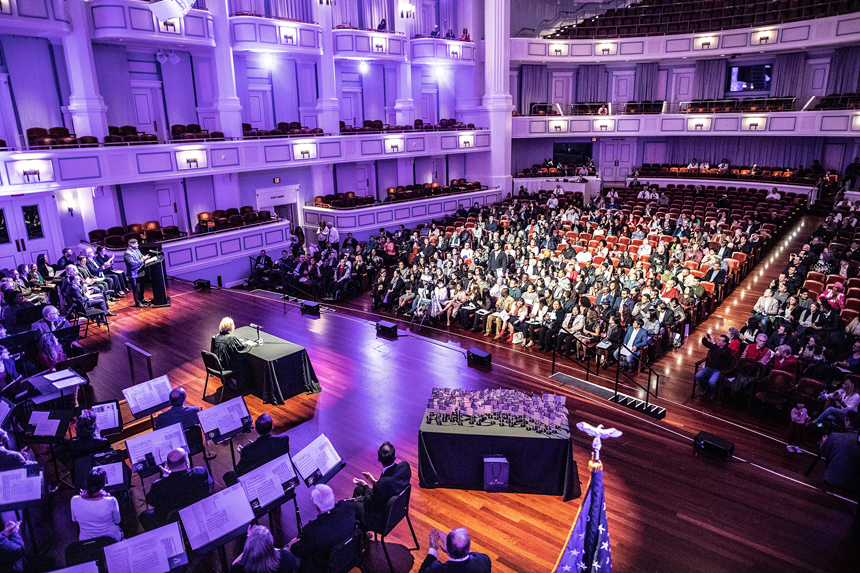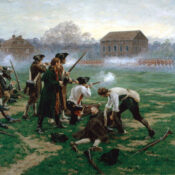I’m surprised how long the line in the lobby is, stretching a dozen yards, then around the corner and down some steps. And this is just for the check-in table. As I wander past, I see individuals, couples holding hands, and extended families grouped together and chatting. A wide variety of ages, cultures, and personal styles is reflected in the clothes they wear. There’s a young man in a dapper suit and dark tie. Behind him, an older couple in brightly patterned kaftans. Farther back: jeans and sneakers, hijabs, pantsuits, daishikis.
I try to read what’s behind their smiles, their scowls, their distracted stares, but I’ll never truly know what they are feeling as they wait for this major life change. The only personal experience I can equate it to is the birth of my first child: In the morning, I was a son and a husband, but by the end of the day I had also become a father, with a host of new expectations and responsibilities and a bright new outlook on the future.
By the end of this day, Wednesday, March 20, 2024, all the people waiting in this line will finally be able to call themselves Americans.
I duck backstage. The ceremony isn’t here for me, I’m here for it as part of the Indiana Wind Symphony, a local volunteer wind ensemble of which I am a member.
After several minutes warming up backstage, word gets passed back that it’s time. I grab my clarinet and music, head onto the stage, and find my seat to the conductor’s left.
The event is held on the stage of the Palladium at the Center for the Performing Arts in Carmel, Indiana. The band takes up most of the back half of the stage, offset toward stage right. Behind us, above the choir loft, the wall is lit up in red, white, and blue. At stage left, some chairs and a lectern have been set out for presenters. Down front stand two tables covered in black cloth. The one at center stage, currently empty save a microphone on a small stand, has a chair behind it; the table to its right holds ranks of identical blue gift bags. Hand-size U.S. flags on wooden rods poke from their open tops.
We start playing a little after 11:30, mostly marches and patriotic music, like Henry Fillmore’s “Americans We” and band arrangements of “St. Louis Blues” and “America, the Beautiful.” The IWS isn’t here in any legal capacity, only to make the whole process more pleasant and memorable.
Out in the audience, in the center of the hall, the petitioners find their assigned seats. Clustered in other areas are the people who have been invited to witness the event: family, friends, sponsors, maybe even employers. This ceremony isn’t open to the public.
At about noon, and after a few short announcements, we all rise for the entrance of the honorable Robyn Moberly of the Southern District of Indiana. On any other day, the Palladium is a concert hall. Today, it’s a courtroom. Actual courtrooms are the usual location for such a ceremony, but sometimes a larger space is sought when there are many petitioners. More expansive venues were doubly appreciated when COVID led to social distancing. This 1500-seat auditorium made for a great location, and though many activities have shifted back to their pre-COVID ways, this has now become an annual tradition in Carmel. This is the fifth such naturalization ceremony at the Palladium, but the first that I have attended.

To begin the ceremony, Assistant U.S. Attorney Kate Oliver steps to the lectern. She begins by mentioning (thus adding to the official record) that all of the 96 citizenship candidates have completed everything required to become naturalized American citizens; suddenly this feels like a college graduation ceremony — all the classes done, all the tests taken. Oliver makes a motion to administer the Oath of United States Citizenship and then sits down.
But before the oath is administered, Judge Moberly calls on Susan Bales of the U.S. Citizenship and Immigration Service to do a roll call of the countries of origin. There are 33 in all, from Afghanistan to Zambia, and the people are invited to “stand and be recognized” when their country of origin is called.
Close to the end of the list, I am surprised to hear “Soviet Union,” which hasn’t been a country in 32 years. It is pointed out to me in whispers that these are the countries in which these candidates were born, and some of them are well over 32 years old.
After the roll call, Judge Moberly administers the Oath of American Citizenship. People born into U.S. citizenship have not taken this oath, and it’s worth knowing what we expect of new citizens, what they’re giving up, and what they’re promising.
The oath as read that day goes like this:
I, [state your name], hereby declare, on oath, that I absolutely and entirely renounce and abjure all allegiance and fidelity to any foreign prince, potentate, state, or sovereignty, of whom or which I have heretofore been a subject or citizen; that I will support and defend the Constitution and laws of the United States of America against all enemies, foreign and domestic; that I will bear true faith and allegiance to the same; that I will bear arms on behalf of the United States when required by the law; that I will perform noncombatant service in the Armed Forces of the United States when required by the law; and that I take this obligation freely, without any mental reservation or purpose of evasion; so help me God.
After the oath, a cheer goes up. As of this point, we are all Americans.
The band performs the national anthem to the standing audience. It strikes me as both telling and heartening that the first experience of these new Americans is a musical one, and that I am a part of it.
Now that the oath has been administered, the whole process could end here. But if these new citizens hadn’t learned it already, they are learning it now: We Americans love our traditions, our formalities, our pomp and circumstance. There must be speeches.
We begin with Judge Moberly delivering a short address in which she reminds us that, save the Native Americans, we who were born into citizenship are all here because of immigrants in our families’ past, and that immigrants are what made the United States what it is. “Virtually everything we have of value in this country, from political freedoms to economic progress,” she says, “was in some positive way influenced by immigrants.”
She ends her speech quoting John Quincy Adams, with a catch in her throat: “You will never know how much it cost [the present] generation to preserve your freedom. I hope you will make good use of it.”
The next two things are, according to the judge, customs in this district. The first is to have the youngest new citizen lead the group in the Pledge of Allegiance — on this day it’s an 18-year-old woman who came from Burma. Next, an American flag that had been flown over the U.S. Capitol is presented to the eldest new citizen. (Unfortunately, they neglected to announce this man’s age or country of origin.)
And then the speeches: First up, Jeffrey McDermott, president and CEO of the Center for the Performing Arts, offers his welcome and congratulations. This is followed by letters from the relevant Congressmen of the area. Monica Kozlowski, regional director for Senator Todd Young, reads a letter from the Senator; likewise Dianne Hubbard, community liaison for the office of Representative Jim Baird, does the same for her boss. Congress is currently in session, so both Congressmen are in Washington, D.C., on this day.
The letters are what you would expect, both starting with “My fellow Americans,” congratulating them on the achievement, reinforcing that they made the right choice, and reminding them that they have made a commitment this country. Senator Young also emphasizes how great Indiana and its people are, too, which is a nice touch.
The centerpiece of most school graduations is the procession of the students across the stage to receive, one by one, their diplomas (or, more often, an empty diploma holder for the paper that will arrive later in the mail). Not so for this ceremony. After the politicians have had their say, Judge Moberly announces that the local chapter of the Daughters of the American Revolution will be handing out flags after the ceremony and that representatives of the Marion County Clerk’s Office and the League of Women Voters will be available in the lobby to register all 96 of these new Americans to vote.
She then announces the band’s final contribution for the day, a performance of John Philip Sousa’s “Stars and Stripes Forever,” and “with that, court is adjourned.”
As I collect my things after that performance, an announcement is made asking that the new citizens remain in their seats as the administrators prepare for the final part: handing out naturalization papers. I see they have stacks of documents already collated, and the strict assigned seating suddenly makes more sense. Not wanting to intrude, I don’t stay for this part, which is absent of pageantry, but I know that these citizens will step out into the sun as changed people, both legally and emotionally. I don’t know why they each decided to give up their allegiances to their home countries and come here, but I know U.S. citizenship was important to them.
Patriotism is an odd thing. Merriam-Webster defines it broadly and simply as “love for or devotion to one’s country,” and though we all have a sense of what that means, those words love and devotion are intensely personal and hard to define. Even country is a multifarious concept: Does patriotism focus on the government? The land? Its people? Its history?
And certainly patriotism takes on a more significant meaning when you’re not born into a country’s citizenship but rather choose that country, study it, and undergo the long and surely aggravating process to become one of its citizens. To become a naturalized citizen means investing in one’s citizenship, in building a new patriotism from scratch.
Those 96 people at the Palladium will experience their first Independence Day this week, not simply to celebrate being American but choosing to be American. It’s an approach we should all take. The celebration of our country’s anniversary should serve as a time to ruminate on what it means to be an American — our freedoms, but also our responsibilities — and then to choose to be American, to be better citizens and neighbors, to defend democracy and freedom, and to “bear true faith and allegiance to” the United States of America.
Become a Saturday Evening Post member and enjoy unlimited access. Subscribe now



